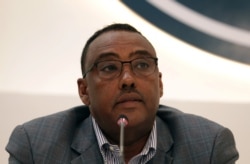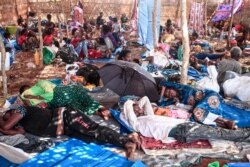Witnesses in Ethiopia report that the country's air force bombed the capital of the northern Tigray region Monday, as the United Nations says the growing conflict has forced more than 25,300 refugees to flee into neighboring Sudan.
Residents in Mekele told VOA that the bombing demolished homes and partially damaged student dormitories at St. George's Church Felege Hiwot school.
Debretsion Gebremichael, leader of the Tigray People's Liberation Front (TPLF), told the Reuters news agency that at least two civilians had been killed Monday and a number of others wounded. There was no independent confirmation of the claims.
Ethiopian Deputy Prime Minister Demeke Mekonnen said Monday that the government was doing all it could to safeguard civilians.
"The government will take responsibility" for the safety of civilians, he told a meeting with members of the diplomatic corps and representatives of foreign organizations in Ethiopia's capital, Addis Ababa.
Ambassador Dina Mufti, spokesman for Ethiopia's Ministry of Foreign Affairs, told VOA that the federal government was targeting individuals "who committed crimes" against it.
"Ethiopia will never let its national interests be compromised," he said, describing the military offensive as "an internal affair."
Ethiopian Prime Minister Abiy Ahmed, who won the Nobel Peace Prize last year, announced a military offensive against the regional government in Tigray on November 4.
The U.N. refugee agency said Monday that the military conflict had forced more than 5,000 refugees into Sudan on Sunday, the highest single-day number of arrivals since the start of the conflict in Tigray.
Also Monday, Abiy's government again refused international pleas for mediation after Uganda's President Yoweri Museveni met Ethiopia's foreign minister to press for negotiations.
Redwan Hussein, a spokesman for the government's Tigray crisis task force, told reporters that "mediation at this point will only incentivize impunity."
"We have never asked Uganda or any other country to mediate," he added.
Calls for negotiations have been growing, as the conflict has spilled into neighboring Eritrea and threatens the stability of the wider Horn of Africa region.
Tigray officials accused Eritrean troops of entering the conflict on the side of Abiy's government in Ethiopia. Eritrean officials deny any involvement.
On Sunday, Gebremichael confirmed his forces fired missiles at Eritrea's capital, Asmara, and threatened more attacks, vowing, "We will take any legitimate military target, and we will fire.''
Eritrea has long been at odds with the TPLF, experts say, and they fear the country could be drawn into the conflict between the TPLF and Ethiopia's federal government.
Hundreds have been killed since Abiy sent the national defense force into Tigray in early November after accusing local forces there of attacking a military base.
Amnesty International has reported that scores of civilian laborers, possibly hundreds, were stabbed or hacked to death in the town of Mai-Kadra in southwest Tigray. It says the victims appeared to have been day laborers, who were not involved in military operations.
The Ethiopian government has blamed the attack on the TPLF, which has denied involvement. Tigrayan regional leaders said the allegations are part of a continuing effort to demonize Tigrayan people.
Eskinder Firew in Addis Ababa, Mulugeta Atsebeha in Mekelle, and Solomon Abate Gebremariam in Washington contributed to this report.








